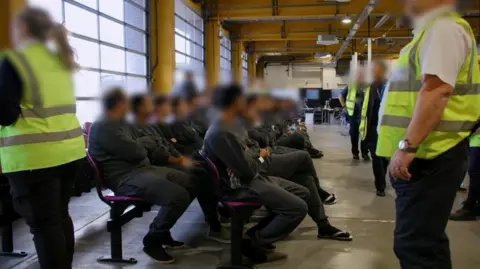Government plans to overhaul asylum appeals system
6 minutes agoIain WatsonPolitical Correspondent, BBC NewsTabby WilsonBBC News

 PA Media
PA MediaThe government is planning an overhaul of the asylum appeals system, as it tries to cut the number of migrants staying in hotels while they await a ruling.
A new, independent body will be established, staffed by independent adjudicators, with the aim of hearing cases more quickly.
The Home Secretary, Yvette Cooper, said she was taking practical steps to end unacceptable delays.
The government has been under increasing pressure to reduce its reliance on asylum hotels. It now wants to regain the initiative.
Ministers have pledged to end hotel use in this parliament – but 32,000 asylum seekers are still housed in them.
Cooper said that while initial decisions on asylum applications had been speeded up, there had been “unacceptable delays” when people who were turned down decided to appeal.
It currently takes on average just over a year for an appeal to be heard and 51,000 cases are awaiting a decision.
During this time failed asylum seekers are accommodated at the taxpayers’ expense.
So a new panel of independent adjudicators is to be appointed to deal with appeals – ministers believe it will act more swiftly than the courts.
The government has promised to give more details about how it will speed up cases in the autumn.
The Conservatives have said the system is in chaos while Reform UK has argued for the mass deportation of those who arrive by illegal or irregular routes.
The past week has seen rising frustration over where asylum seekers are housed, with demonstrations held across the UK on Saturday to protest against the use of hotels.
Epping has been a focal point for protesters since July, with thousands of people demonstrating outside the Bell Hotel after a resident asylum seeker was charged with sexually assaulting a 14-year-old girl in the town.
On Tuesday the High Court granted the council a temporary injunction to block asylum seekers from being housed in the Bell Hotel, after it argued that the hotel had breached local planning controls by changing its use, resulting in events that were a public safety risk.
Those currently in residence must be moved out by 16:00 on 12 September.
The government is seeking the right to appeal against the High Court ruling.
Cooper said the government was committed to closing all asylum hotels but that it needed to happen in “a properly managed way”.
A number of other councils are reportedly considering taking legal action following the ruling, including Tory-controlled Hillingdon, which currently houses 2,238 asylum seekers.
Conservative leader Kemi Badenoch published an open letter urging Conservative council leaders “to take the same steps if your legal advice supports it”, while Reform UK’s Nigel Farage wrote in the Telegraph that councils controlled by his party would do “everything in their power” to follow Epping’s lead.
According to figures published by the Home Office earlier this week, 131 of more than 300 local authorities in the UK currently house asylum seekers in “contingency accommodation”, primarily made up of hotels.
Of those 131 areas, 74 are fully or partially led by Labour, 30 by the Liberal Democrats, 19 by the Conservatives, nine by the Green Party and one by Reform UK.